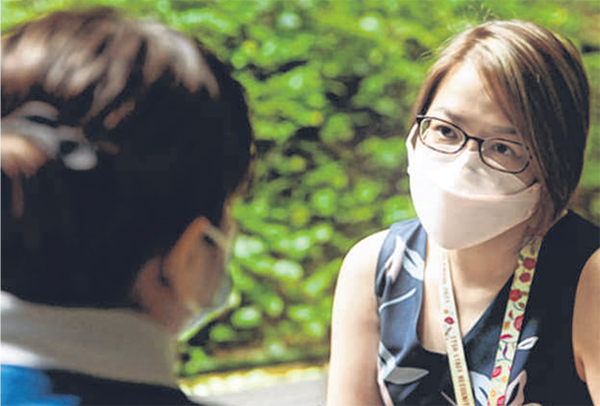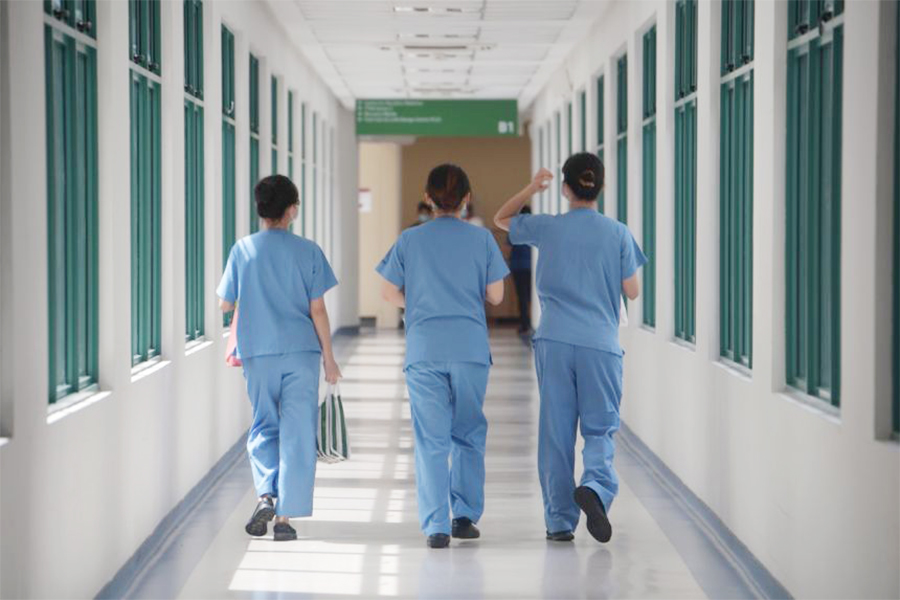From getting sexual advances from patients to being abused verbally, healthcare workers are facing increasing harassment. The Sunday Times looks at the reasons for the surge and how the issue is being addressed.
The Straits Times (28 November 2021)
One patient grabbed a nurse’s breast twice, while another asked a nurse if she provided sexual services.
These incidents happened at the National University Hospital (NUH) which said it is seeing more of its healthcare workers reporting that they have been abused since staff have been encouraged to speak up.
And it added that numbers do not tell the full story.
 TTSH staff discussing programmes to support distressed colleagues under the staff support programme
TTSH staff discussing programmes to support distressed colleagues under the staff support programme
A Ministry of Health (MOH) spokesman said the number of abuse and harassment cases at public healthcare institutions has been increasing over the past three years.
In 2018, there were 1,080 cases reported and this rose to 1,200 cases in 2019. The number of cases spiked to 1,300 last year.
MOH did not provide figures for the first 10 months of this year. It said it takes all cases of abuse and harassment against healthcare workers seriously and added:
“We adopt a zero-tolerance policy towards abuse and harassment of our healthcare staff and will take action against persons who do so. Our healthcare workers deserve to work in a safe environment while they care for patients.”
But reported figures may not reflect what is happening on the ground, said Associate Professor Peter George Manning, emeritus consultant at NUH’s emergency medicine department.
Prof Manning, who is also the vice-chairman of NUH’s medical board, said: “There are abuse cases that go unreported. Sometimes when nurses and doctors face an abusive patient, they’d rather brush it off and not make a fuss about it.
“But it’s a serious issue and it’s worrying because they suffer in silence, until they reach a tipping point.”
He recalled how an elderly male patient had grabbed a nurse’s breast on two occasions last year. Said Prof Manning: “He was severely told off and he did not do it again.
“But there was another incident that also happened last year where a male patient asked a young nurse if she was interested in providing him with sexual services. She was flabbergasted.”
The patient was subsequently given a stern talking to by a senior doctor and a senior nurse after the young nurse reported the incident.
Prof Manning added that verbal abuse cases at NUH has specifically seen an increase this year as compared with the past few years, but noted that there could be more abuse cases the hospital is unaware of.
He added: “That is why we have been focusing our efforts to get the message across to staff to defend themselves by reporting the incident. They know not to get into a fight with the patient, and they are aware of what they should not put up with.”
An NUH spokesman added that patient-facing front-line staff like doctors, nurses, allied health personnel, housekeepers and security officers are more susceptible to physical and verbal abuse due to the greater exposure and interaction with patients and their family members.
Tan Tock Seng Hospital (TTSH) and the National Centre for Infectious Diseases said they have seen an increase in abuse cases.
A TTSH spokesman said that in 2019, the facilities saw 218 cases and this fell to 158 cases in 2020. But cases have spiked to 244 in the first 10 months of 2021.
NOT SUFFERING IN SILENCE
But the numbers have been increasing not just because people may be facing more stress, but also because more of our healthcare workers are seeing the importance in reporting an abuse case when it happens."
- ADJUNCT ASSOCIATE PROFESSOR HABEEBUL RAHMAN, chairman of the well-being committee at Tan Tock Seng Hospital, on the spike in abuse cases to 244 in the first 10 months of 2021 at the hospital and the National Centre for Infectious Diseases. He explains that last year’s dip in cases was due to fewer hospital visitors.
Adjunct Associate Professor Habeebul Rahman, chairman of the well-being committee at TTSH, explained there was a dip in last year’s figures due to fewer visitors at the hospital.
He said: “But the numbers have been increasing not just because people may be facing more stress, but also because more of our healthcare workers are seeing the importance in reporting an abuse case when it happens.”
At Singapore General Hospital (SGH), the number of abuse cases has been increasing over the years. Ms Jennifer Wee, its chief communications officer, said there were close to 180 cases from January to October this year, up from about 70 cases for the whole of 2017. In 2020, the hospital saw about 170 cases.
At Ng Teng Fong General Hospital, there have been 35 cases recorded in 2021 so far. The hospital saw about 38 of such abuse cases each year from 2017 to 2020.
Meanwhile, Khoo Teck Puat Hospital said the number of reported healthcare worker abuse cases has almost doubled from 2016 to 2020. It did not provide figures for that period and for this year.
But things seem to be improving at Changi General Hospital (CGH). Its chief operating officer, Ms Sandra Koh, said the hospital has seen nearly 100 cases of abusive behaviour against healthcare workers in the first nine months of 2021. There were 200 cases reported at CGH for the whole of 2020.
She said more than 80 per cent of the verbal abuse cases were committed by patients, while the rest were committed by the patients’ family members.
One incident it saw this month involved a patient who got angry when he realised he could not go home after being hospitalised for a week.
He yelled expletives and derogatory racial slurs at the doctor and the nurses trying to help him.
The doctor tried to calm him down. But the patient took off his shirt and threw things at the healthcare workers around him.
The patient even threatened to sue the hospital.
To tackle such incidents, healthcare workers at TTSH have been taught escalation protocols should the need to report an abuse incident arise.
Ms Geeta Pattath Raghavan, assistant director of nursing at TTSH, said: “There are also panic buttons placed at each ward which healthcare workers can press should they feel unsafe or threatened.
“When it is pressed, staff from adjacent wards and security officers will be alerted and will assist where they can.”
But this is not a response used to scare the patients, said Prof Habeebul.
“This is really just to protect all parties and perhaps even prevent the patient from doing something that is irreversible,” he added.
While such measures are important, Prof Habeebul said he hopes for mutual respect between all parties.
“At the end of it all, we just want our patients to recover and get well,” he added.
Borderline abuse can be just as traumatic in the long run
 Exposure to prolonged abuse can cause psychological trauma or lead the healthcare workers to feel emotionally drained.ST PHOTO: KUA CHEE SIONG
Exposure to prolonged abuse can cause psychological trauma or lead the healthcare workers to feel emotionally drained.ST PHOTO: KUA CHEE SIONG
Are you stupid or something?”
Words like these may not be vulgarities, but are just as hurtful to a healthcare worker when directed at them by a patient, said Ms Tong Yoke Tho, director of quality service management at Tan Tock Seng Hospital (TTSH).
Ms Tong was speaking to The Sunday Times about borderline abuse in TTSH and how such incidents can impact healthcare workers in the long run.
Dr Hoi Shu Yin, TTSH’s chief nurse, said: “Borderline abuse may not be physical abuse or outright verbal abuse that includes racist remarks or expletives, but it tends to be an ongoing abuse that can cause healthcare workers to feel disrespected and distressed.
“Staff may not think that the incident warrants escalation, but we encourage staff to report it.”
Exposure to such prolonged abuse can cause psychological trauma or lead the healthcare workers to feel emotionally drained, added Dr Hoi.
Ms Geeta Pattath Raghavan, assistant director of nursing at TTSH, noted that a number of foreign nurses make up the nursing workforce at TTSH, and that it is not uncommon for them to be subjected to racist remarks.
She said: “There have been occasions where patients tell these nurses, ‘You are a foreigner. Go back to your own country.’
“Some have even questioned if the nurses were trained locally. Not only does this bring about emotional trauma, but they can sometimes get so demoralised that they cannot think about coming back to work.”
She added that Covid-19-induced visitation limits at hospitals have also led to a handful of patients’ families getting frustrated.
“I have had people tell a few of my nurse managers, ‘Don’t act like a god’ when they were unable to get an extension of visitation hours. We try our best to accommodate when we can, but such rules are also for their safety,” said Ms Geeta.
Healthcare workers at TTSH are trained to recognise an abusive situation and escalate it to their supervisors so that action is taken to keep patients and staff safe.
Ms Tong said: “There is also a staff support staff programme, where our healthcare workers are encouraged to look out for one another.
And when an incident occurs, they know to step in and try to mediate the situation.
“They will also follow up and check on how their peers are doing, especially if they have been abused.”
She reiterated that while such incidents do happen, most of the patients and their families have been very understanding.
Dr Hoi added: “The incidents we spoke about should not be generalised.
Most of the people we care for have shown so much appreciation to us over the years.
And we could not be more thankful for that.
“Regardless of what happens, our mission remains the same. We will always look after our patients and ensure they receive the best possible care.”